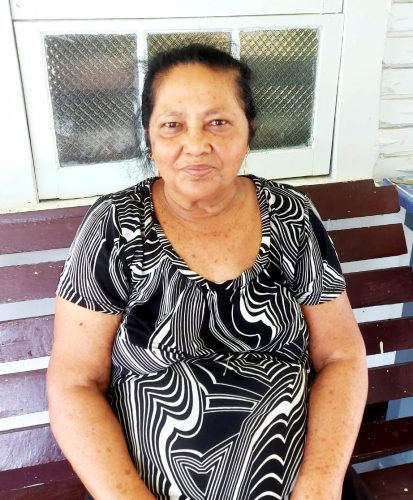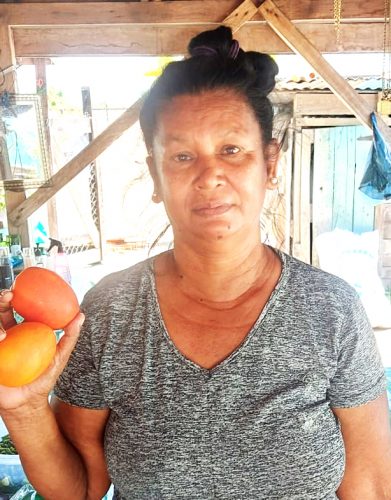Interviews and photos by Subhana Shiwmangal
Stabroek News spoke to members of the public in Line Path A, Skeldon, Region Six about the rising cost of living and how it is affecting them. The following are their comments:
Abdul Hanif, a 74-year old pensioner said: “The cost of living is not only affecting me but everyone in Guyana since the prices for all food items have doubled in the market. My wife and I are trying to cope with it. For example, a couple months back, a portion of Manarie [fish] cost $1,000; now the cost is $2,000. Now I can’t buy a gilbaka [fish] because the price has gone up in the market. I think the government should drop the duty on all food items that are imported in Guyana since people have to pay tax on all food items. Also, people’s monthly pension have to raise since everything has gone up in the market and we can’t live on our current pension. I didn’t accept the amount of NIS give to me so I’m just receiving my monthly pension.”
Ajeeran Hanif, a 73-year-old pensioner said: “Everything has gone up in the market and it affects my family and I a lot, we would just have to buy less food items now to cope with the cost of living. All grocery prices gone up in the market. A few months back a pound of garlic cost $100; now a pound of garlic cost $160. A few months ago, a pound of potatoes were sold cheaper in the market; now a pound of potatoes cost $200. The government should reduce the taxes on all food items so people can purchase food items at an affordable price.”
Bhoopwattee Megnat, a 56-year-old single parent said: “The cost for all food items in the market have gone up and the cost of living is getting hard for everyone. I’m a single parent and my four children have all grown up now and gotten married. I’m living on survival benefits of $17,500 a month and from that money, I have to buy grocery items, pay my utility bill and monthly rent of $20,000. Items are not easy to buy with the cost of living being so high. For instance, a small bag of Karibee rice cost $1,300/$1,200 a few months ago; now the cost for that same bag is $2,000. Also, a few months ago, I used to buy a 2-pound packet of sugar for $160; now 2 pounds of sugar cost $400. If the government reduce the cost of living a little and the bill more, this will be helpful for the people. Also, I think the government should raise the survival benefits a little because as a single mom it is hard. I get help from my children sometimes when they can help and NIS benefit but that the NIS money is not enough money to help me pay the bills and run the home.”
Ramdeo Sooklan said: “The cost of living is high and it is affecting me a lot since my monthly pension cannot support both my wife and i. We are now selling drink to carry us through the month. My wife and I live alone and I can tell you that the small business do help us to buy things we need for the month, including our medication. Sometimes the hospital would be out of medication and we will have to find the money to buy it. Apart from that everything has gone up in the market, even the drinks that I buy to sell back raise in the market. A case of Thrill (375ml) cost $2,500 a few month ago; now a case of Thrill cost $2,960. Also, a case of XL energy drink a couple months ago cost $3,600/$3,500; now the cost for a case of XL cost $3,900. Based on my situation, I would like if the government can give me some kind of discount on my purchases to help with the cost of living.”
Drowpattie Napal said: “All food items have risen in the market and it affects me a lot since I’m spending more on the items. For example, a few months ago, a parcel of bora cost $200; now 2 small parcel of bora cost $600. And, a couple months ago, a pound of tomatoes cost $500; now, 3 tomatoes cost $1,000 in the market. We can’t fault the farmers because the weather is extremely dry but instead, I think the government can try to lower the price food items are sold for in the market. “
Nichlous Sukhram said: “Everything gone up in the market. It’s not affecting me a lot since my family and I are coping with the cost of living. The cost for bora and other green gone up in the market. I’m a family of five consisting of my siblings and my parents. My father is the sole breadwinner for my family and he try to provide for us. Clothes nowadays is expensive in the market here. For example, a few months ago, a shirt cost $2,500; now a shirt cost $3,500/$4500 here. A couple months back, a pair of slipper cost $ 3,500; now the cost for a pair of slipper is $5,000. At another market I saw the clothes selling cheaper but in Skeldon, the prices for all items are high. I think the government should look into the community to see how the people are selling the items in the market and see what they can do to help.”
Sonny Parag, a 72-year-old pensioner said: “Everything gone up in the market – food items, building material; etc. My wife and I would have to stay without a lot of things when we can’t afford it. Even the doctor’s fees expensive but we are trying to cope with the high prices. Building material such as: concrete blocks gone up in the market. A concrete block, a few months ago cost $90/$95; now a concrete block cost $120. The government has to take immediate action on wholesalers and retailers who are selling items at a high price. Farmers have to buy the chemicals for the plants so the crops can be healthy and ready for the market and those chemicals are not cheap.”
Devika Heima, a 69-year-old pensioner said: “The cost for all items in the market has gone up sky high and it’s not working out for me because I’m not getting to save. My husband and I live in the home and when we used to go to the market with $15,000/$20,000 to buy food items, now we have to go with over $30,000 to buy the food items we want. Every day the cost for grocery increasing in the market. Flour, sugar, oil, milk, onions, rice and more gone up in the market. For example, a couple months back, a gallon bottle of oil cost $3,000 and something; now the bottle of oil cost $4,940. A pound of potatoes a few months ago cost $60; now a pound of potatoes cost $180. I think the government should reduce the taxes on food items sold to the consumer. Also, look into why the wholesalers and retailers are raising their prices. “
Badewantie Mohanlall, 40-year-old housewife said: “The cost of living is affecting my family and I a lot since the salary is low and the cost for food items in the market is high. My family consist of five persons including my daughter who works full time, my husband who works when he gets work and my other two children are not working. One is sickly and the other just turned 16 years old. I’m trying to get a job to help provide for my family since two persons working in the home and the salary they received is not enough to support us. When I go to the market with to buy food items, I’m not getting to buy all the food items I need for the home because the prices for items are high and the money is not enough. For instance, a few months ago, a 5-litre bottle of cooking oil cost $1,550; now the bottle of oil cost $2,300. Also, a few months back, 3 gallon of rice cost $1,100; now a bag of rice cost $1,900. I think the government should reduce taxes on food items so food items can be sold at an affordable price to consumers.”
Azam Looknauth said: “The cost of living has gone up and this is hard on me because I have to buy less food items to survive. I’m working at a chicken farm and lives alone. Well, I’m planting vegetables instead of buying at the market but the cost for other grocery items such as: rice, oil and many others, have gone up in the market. For example, before a gallon rice cost $700; now a gallon rice cost $800. Before a small bottle of oil cost $760/$740; now the small bottle of oil cost $900 now. I think the government should help people with the cost of living by reducing the price on all food items.”
















